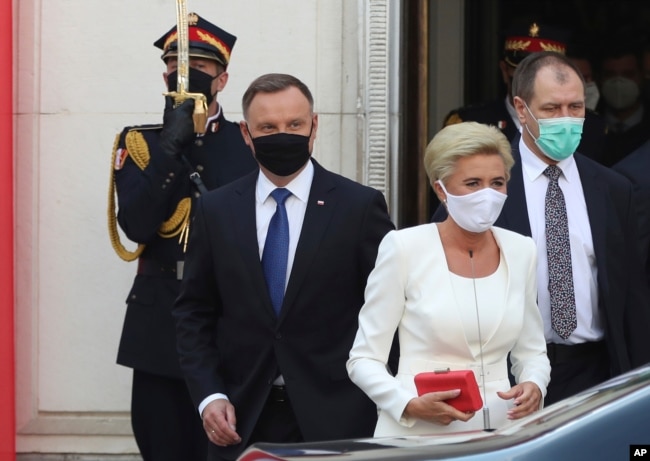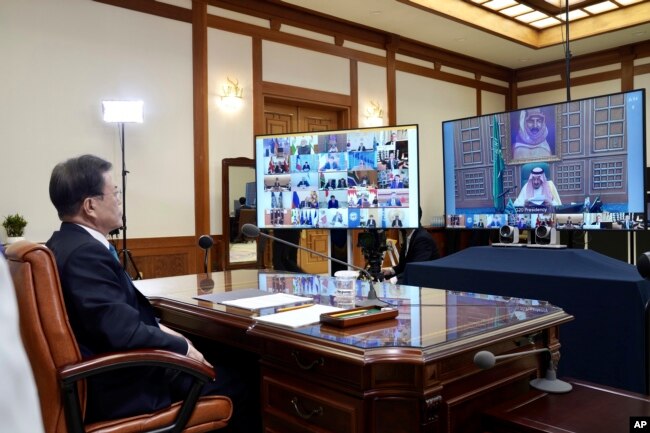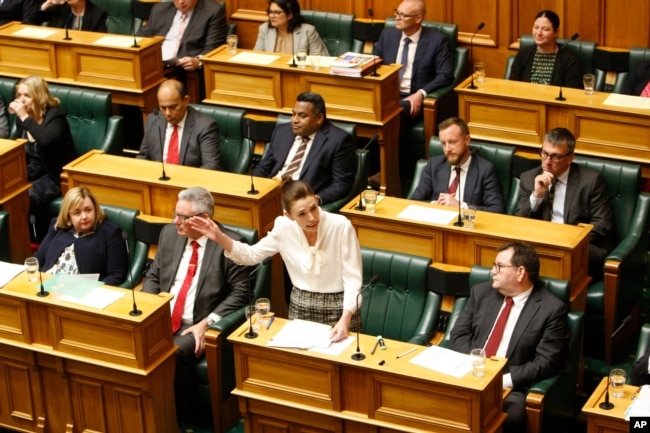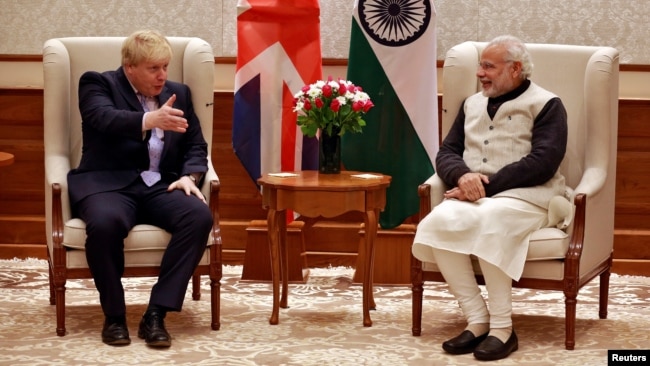民主主義国家のリーダー
世界を知るって、良い勉強になります!!!
早速今日のVOAニュース
他の民主主義国はどのようにリーダーを選ぶのか
How Other Democracies Select Leaders
December 14, 2020
アメリカ人は11月3日の選挙日にジョー・バイデンやドナルド・トランプに直接投票しませんでした。それは、米国がほとんどの民主主義国とは異なることになります。
代わりに、彼らは正式に大統領を選択するために1ヶ月以上後に会う選挙人に投票しました。これらの選挙人は、月曜日にジョー・バイデン氏を次期大統領に正式に選ぶために会合を開きました。
このシステムは、選挙人会として知られています。
他の民主主義国では、国家指導者は、有権者によって直接選出されるか、議会制度によって選出されています。議会制では、全国会議で最も多くの議席を獲得した政党が政府のトップを選出します。
ここでは、世界の民主主義国がどのように指導者を選んでいるかを見てみましょう。
1994年、南アフリカでは、すべての人種の市民に投票が認められた初の選挙が行われました。南アフリカ人は候補者ではなく政党に投票します。国民議会で過半数の議席を獲得した政党が、その政党のリーダーを南アフリカの大統領として選出することができます。
1994年 アフリカ国民会議(ANC)のリーダーであるネルソン・マンデラが大統領に就任しました。以来、同党は同国の政治を支配してきました。しかし、2019年の投票では、ANCは57%の得票率で、まだ最小の多数派で勝利しました。

2020年8月6日、ポーランドのワルシャワで行われたドゥーダ大統領の2期目の宣誓式の後、国会議事堂を後にするポーランドの保守派大統領アンドルゼイ・ドゥーダ(左)とファーストレディのアガタ・コルンハウザー・ドゥーダ(右)。
ポーランドの民主主義は、東欧全域で共産主義が崩壊した後、1989年に生まれ変わりました。ポーランドでは、国民投票で50%以上の得票を得た候補者が大統領になります。50%以上の得票を得た候補者がいない場合は、上位2人の候補者が第2ラウンドで対決します。
これまでに一次選考で当選したのは一人だけで、2000年に再選したアレクサンダー・クワスニェフスキ氏がそれにあたります。ポーランドの反共主義連帯運動の創始者として有名なレヒ・ワレサ氏でさえ、ポーランド初の人気投票で選ばれた大統領になるためには、2回目の投票が必要でした。
イギリス
エリザベス2世女王は国家元首です。しかしイギリスの有権者は政府のトップである首相を選びます。
有権者は自分の住んでいる地域の議員を選びます。そして、通常、650議席の国会で最も多くの議席を獲得した政党が政権を握り、その政党の党首が首相になります。
どの政党も過半数の議席を獲得できない場合は、連立政権が成立することもあります。勝利した政党は、ほとんどの場合、民衆投票で最大のシェアを獲得した政党です。いくつかの政党が競い合うため、どの政党も民衆投票の過半数を獲得することは稀です。
ボリス・ジョンソン氏の保守党は、2019年の選挙で民衆投票の44%を獲得しただけでした。しかし、彼の党は議会で80議席の過半数を獲得し、首相の座にとどまることとなりました。
ブラジル
ブラジルの大統領は直接選挙で選ばれます。選挙は通常、第一次勝者が受け入れられた投票の50%以上を取得しない限り、第2回目選考が開催されています。
ブラジルでは投票が義務付けられています。このため、有権者の投票率は高いのですが、誤投票や空投票も多いのです。投票に失敗した場合の罰金は1米ドル以下です。2018年には、2回目の投票で50%以上の票を獲得したジャイル・ボルソナロ氏が大統領に就任しました。
韓国

FILE - 聯合ニュース通信を通じて韓国大統領ブルーハウスが提供したこの写真で、文在寅(ムン・ジェイン)大統領は2020年3月26日、ソウルの大統領ブルーハウスでコロナウイルスの発生について議論するためにG20仮想サミットに出席しました。
韓国の大統領は、第一次民衆投票で直接選出されます。最も多くの票を得た候補者が大統領になります。立候補するには40歳以上でなければなりません。
現職のMoon Jae-in文在寅(ムン・ジェ‐イン)大統領は2017年5月に行われた特別選挙で当選しました。この選挙は、韓国の憲法裁判所がPark Geun-hye 朴槿恵(パク・ク‐ネ)氏を汚職の罪で罷免した2カ月後に行われました。現在は権力乱用や贈収賄などの罪で服役中です。
台湾
1994年の憲法改正により、大統領のための直接選挙が制定されました。それ以前は、総統は国会によって間接的に選ばれていました。1996年の選挙では、台湾で初めて民衆投票で総統を選出しました。
2016年には、Tsai Ing-wen 蔡英文氏(ツァイ・イング‐ウェン)が女性初の総統に選出されました。彼女は今年初めに再選されました。
ニュージーランドの首相は他の議員によって選ばれ、通常、選挙で最も多くの票を獲得した政党のリーダーです。ニュージーランドの投票システムの下では、政党はしばしば議会で過半数を指揮するために同盟を形成する必要があります。
ニュージーランドは完全に独立した民主主義国家ですが、国家元首はイギリスのエリザベス女王2世のままです。そのため、首相は女王の代表である総督の承認を得なければなりません。
労働党のリーダーであるジャシンダ・アーダーン首相は、2017年10月から就任している。今年10月に2期目の当選を果たしました。

FILE - 2020年12月2日、ウェリントンで国会で演説するニュージーランドのジャシンダ・アーダーン首相。
インド
14億人近い人口を抱えるインドは、世界最大の民主主義国家とよく呼ばれます。政府のトップは首相です。彼または彼女は、国会の下院であるLok Sabhaロクサーバの多数党の議員によって選出されます。2014年、総選挙でバラティヤ・ジャナタ党(BJP)が勝利し、ナレンドラ・モディ氏が首相に就任しました。
インドの大統領は、選挙で選ばれた政府に”助言、奨励、警告”をすることができる儀式的な国家元首としての役割を果たしています。大統領は、国会や州議会の選出議員によって間接的に選出されます。2017年には、5,000人近くの議員が投票でラム・ナート・コヴィンド氏を大統領に選出しました。
How Other Democracies Select Leaders
 FILE - India's Prime Minister, Narendra Modi (R) meets British Foreign Secretary Boris Johnson in New Delhi, India January 18, 2017. (REUTERS/Cathal McNaughton)
FILE - India's Prime Minister, Narendra Modi (R) meets British Foreign Secretary Boris Johnson in New Delhi, India January 18, 2017. (REUTERS/Cathal McNaughton)
Americans did not vote directly for Joe Biden or Donald Trump on Election Day on November 3. That makes the United States different from most democracies.
Instead, they voted for electors who meet over a month later to officially choose the president. Those electors met Monday to officially choose Joe Biden as the nation’s next president.
The system is known as the Electoral College.
In other democratic countries, national leaders are either directly elected by voters or by a parliamentary system. In a parliamentary system, the party that wins the most seats in a national congress selects the head of government.
Here is a look at how democracies worldwide choose their leaders.
South Africa
In 1994, South Africa held its first elections in which citizens of all races were permitted to vote. South Africans vote for political parties rather than for candidates. The party that won the majority of seats in the National Assembly would then be able to elect its own leader as president of South Africa.
Nelson Mandela, the leader of the African National Congress (ANC), became president in 1994. The party has controlled the country’s politics ever since. However, the ANC won with its smallest majority yet in 2019, with 57 percent of the vote.
Poland
Poland’s democracy was reborn in 1989 after the fall of communism across eastern Europe. In Poland, a candidate who gets at least 50 percent of the popular vote becomes president. If no candidate gets at least 50 percent, the top two candidates face each other in a second round.
There has only been one first-round winner, with the re-election in 2000 of Aleksander Kwasniewski. Even Lech Walesa, the famous founder of Poland’s anti-communist Solidarity movement, needed a second-round vote to become Poland’s first popularly elected president.
Britain
Queen Elizabeth II is the head of state. But British voters choose the head of government, the prime minister.
Voters elect a lawmaker for their local area. Then, the party that wins the largest number of the 650-seat Parliament generally takes power, with the party leader becoming prime minister.
A coalition government might be formed if no party wins a majority of seats. The winning party is almost always the one that took the biggest share of the popular vote. It is rare for any party to win a majority of the popular vote because several parties compete.
Boris Johnson’s Conservative Party only got 44 percent of the popular vote in the 2019 election. But his party won an 80-seat majority in Parliament, permitting him to remain as prime minister.
Brazil
Brazil chooses its president through direct election. The election is usually held in two rounds unless the first-round winner gets more than 50 percent of the accepted votes.
Voting is required in Brazil. This leads to high voter turnout but also a number of incorrect or empty ballots. The fine for failing to vote is less than one U.S. dollar. In 2018, Jair Bolsonaro became president after winning more than 50 percent of the votes in the second round.
South Korea
The president of South Korea is directly elected by a single-round, popular vote. The candidate who gets the most votes wins the presidency. A person must be at least 40 years old to run for the office.
The country’s current president, Moon Jae-in, won a special election in May 2017. The election was held two months after South Korea’s Constitutional Court removed Park Geun-hye from office for corruption. She is now serving time in prison for abuse of power, bribery and other crimes.
Taiwan
A constitutional amendment in 1994 established direct, popular elections for president. Before that, the president was indirectly chosen by the National Assembly. The 1996 election marked the first time Taiwan selected its president by popular vote.
In 2016, Dr. Tsai Ing-wen became the first female elected president of the island territory. She was re-elected earlier this year.
New Zealand’s prime minister is chosen by other lawmakers and is usually the leader of the party that gains the most votes in the election. Under New Zealand’s voting system, parties must often form alliances to command a majority in the parliament.
Although New Zealand is a fully independent and democratic nation, its head of state remains Britain’s Queen Elizabeth II. That means the prime minister must officially be approved by the Queen’s representative in New Zealand, the governor-general.
Prime Minister Jacinda Ardern, the leader of the Labor Party, has been in office since October 2017. She won a second term in October of this year.
India
India, with nearly 1.4 billion people, is often called the world’s largest democracy. The head of government is the prime minister. He or she is elected by members of the majority party of the Lok Sabha, the lower house of Parliament. In 2014, Narendra Modi became prime minister when his Bharatiya Janata Party (BJP) won the general election.
The president in India acts as the ceremonial head of state who can “advise, encourage and warn” the elected government. The president is indirectly selected by elected members of Parliament and state legislatures. In 2017, nearly 5,000 lawmakers voted to select Ram Nath Kovind as president.
______________________________________________________________
Words in This Story
communism - n. a way of organizing a society in which the government owns the things that are used to make and transport products (such as land, oil, factories, ships, etc.) and there is no privately owned property
bribery - n. the act or crime of giving or accepting a bribe -- something given in order to get someone to do something